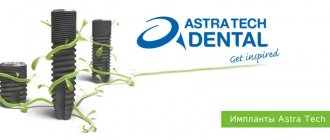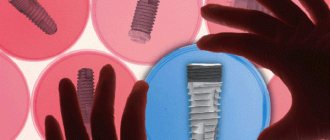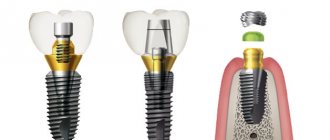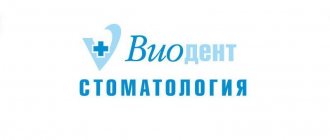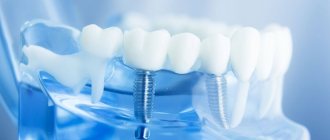- Advantages of U-impl products
- The lineup
- What else does the Swiss company produce?
- When is it possible to use Simple Swiss products and when is it prohibited?
The Swiss company U-impl was founded in 1999 and since then has been focused on the production of dental implants under the “Simpl Swiss” brand and the tools that are used to install them.
Swiss implants have been tested in Russia and several countries near and far abroad. When using Simple Swiss products, successful results in long-term prosthetics were achieved, as their developers promised. There are also a number of scientific publications that prove that artificial roots take root well.
The positive practical results achieved with the use of Simpl Swiss implants attract a large flow of investments into the U-impl company, which allows the manufacturer to constantly improve its products.
Who produces Simpl Swiss and where?
U-impl GmbH was founded in 1999. The main goal of the company was to establish the production of dental implants and the tools necessary for their implantation.
Simple Swiss implants have been successfully tested and passed clinical trials in Switzerland, Germany, USA, Poland, Russia, Belgium, Ukraine and Cyprus. All tests carried out confirmed the high osseointegration, quality and efficiency of dental systems.
The company cooperates with leading Swiss specialists, which helps it successfully develop and implement innovative technologies.
The successful activities of U-impl GmbH attract foreign investors, which makes the company one of the leading manufacturers in the field of implantology.
Today Simpl Swiss is different:
- High competence in the field of dental implantation.
- Powerful financial resources.
- An excellent reputation earned among patients.
- Highly qualified all employees.
- Famous brand.
- Protection from strong competitive pressure.
- The presence of advantages in the field of competition.
In Russia, the company has a developed dealer network in all regions.
About the manufacturer
Simpl Swiss dental implants were developed by the Swiss company formed in 1996. After the production of the first such implants, they were tested in Italy, which confirmed the high ability of these structures for osseointegration.
Today, this brand is recognized all over the world. The company strives to develop and improve the field of implantology, as well as to improve the characteristics of human life and health in general.
Over the three decades of its existence, U-impl has taken a position among the largest suppliers of dental products. Most European clinics are constantly supplied with products produced by this company. Russian clinics have also been using these implants for quite some time.
Simpl Swiss implants are one of the most popular in the world. A large number of models allows you to make a choice both in favor of a budget option and in favor of premium designs. The quality of their manufacture and compliance with international standards allow us to have no doubt about the success of using these structures.
Thanks to the positive practical results of using these structures, the company attracts a large amount of investment, which makes it possible to constantly improve production.
Are they really that good? What makes them special?
- Manufactured from high-quality titanium alloy Grade 5 ELI, completely biocompatible with jaw tissue.
- Implants have a porous surface obtained by sandblasting and acid etching. This design feature helps improve osseointegration. Bone tissue cells penetrate the structure, which significantly accelerates the fusion of the titanium root with the bone.
- High primary fixation provided by the presence of grooves along the apical part. During implantation, the grooves are filled with jawbone.
- In the area where the implant connects to the abutment, the structure has a smooth surface. This prevents the accumulation of pathogenic microorganisms and plaque and prevents the development of inflammation.
- The neck of the rod has a micro thread that reduces the load on the gum. This eliminates bone atrophy. The top of the bone structure and the aesthetics of the gums are maintained throughout the entire life of the structure.
- Reliable connection of the implant to the abutment is ensured by an internal hexagon. This guarantees tight fixation and prevents the penetration of bacteria.
- Great possibilities for aesthetic prosthetics. The catalog contains suprastructures for the manufacture of individual abutments from zirconium alloy, which allows you to obtain the maximum level of aesthetics, which is especially important when restoring anterior teeth.
- Each rod is packed in an individual box . Extraction occurs only in the presence of the patient, which guarantees absolute sterility. All components have their own individual number, which is noted in the patient’s medical record.
- Lifetime manufacturer's warranty (subject to high-quality operation, compliance with all recommendations and rules of care by the patient).
Simple Swiss catalog
There are several types of Simpl Swiss implants:
- Inter is a classic cone-shaped model. Indicated for two-stage implantation.
- Mono Mini is a one-piece design with a variety of threads for use when bone space is limited and immediate loading is required.
- Maxi is an ultra-short, one-piece, aggressively threaded shaft used for immediate loading applications.
Additionally, the implants are supplied with:
- Gum former. It is necessary to give the gums shape after the opening of the dental system, and also promotes the healing of damage.
- Ring former . Used for shaping gums and installing temporary crowns on straight abutments.
- Angled and straight abutments . Various orthopedic products are attached to them. Abutments provide additional prosthetic care after osseointegration.
- Fixing screws for abutments . Used to fix the abutment to the implant.
- Transfer . Used when taking an impression with a closed or open tray to transfer the position of the implant to a working dental model.
When to place implants and restrictions on installation
Implantation is the only method of tooth restoration that is not limited in terms of the absence of elements of the jaw row.
Titanium roots are indicated for installation when :
- it is necessary to restore one, several or all teeth;
- the outermost teeth in the row are missing;
- if you are allergic to the materials from which prostheses are made;
- it is impossible to install removable dentures.
Implantation has its contraindications. Some of them are temporary, that is, after the problem is eliminated, the operation can be performed.
Time restrictions include:
- decreased immunity;
- exacerbation of viral and other diseases;
- periodontal and dental diseases;
- presence of compensated diabetes mellitus;
- insufficient oral hygiene.
Absolute contraindications to implantation of dental structures:
- unstable (uncompensated) diabetes mellitus;
- diseases that negatively affect the functioning of the immune defense - AIDS, HIV, tuberculosis;
- malignant tumors;
- inability to use anesthesia;
- serious pathologies that cause deterioration in blood clotting;
- hypertonicity of the jaw muscles.
- Complete restoration of the dentition in just 4 days!
more detailsRoott Pterygoid Implants Sinus lift is no longer needed!
more details
Once and for life! Express implantation in 4 days with a permanent ReSmile prosthesis
more details
All-on-4, All-on-6, ReSmile, Zygomatic implantation We use all modern methods of dentition restoration
more details
Contraindications
The introduction of an implant into the bone mass of the jaw is not carried out in a number of clinical situations. Experts identify direct and relative contraindications.
Basic:
- malignant tumor processes in the body;
- any form and stage of diabetes;
- treatment with a chemotherapy regimen, which causes a decrease in the complex indicator of the state of the immune system and its functional activity. With such disorders, the implant takes root in rare cases;
- acquired human immunodeficiency syndrome (AIDS), caused by the HIV virus;
- active tuberculosis;
- mental and nervous system disorders;
- syndrome caused by decompensated dysfunction of the heart;
- hemophilia A and B, von Willebrand disease and other pathologies of homeostasis in the system of blood coagulation reactions;
- excessive tension in the masticatory muscles (hypertonicity);
- a set of changes associated with metabolic disorders (metabolic syndrome) that can inhibit the wound healing process and osseointegration of the implant;
- occlusion abnormalities;
- deficiency of mucous tissue in the working area;
- the risk of developing a disease of altered body reactivity (allergy), provoked by painkillers that are planned to be used during the procedure.
Relative:
- insufficient oral hygiene and its consequences;
- weakening of the body’s protective functions due to various diseases;
- gum disease, accompanied by bleeding, pain, swelling, redness and bad breath;
- diseases of dental elements;
- uncontrolled deviations (teeth grinding, addictions).
Most relative contraindications can be easily eliminated.
For other diseases and conditions that are not included in the list of restrictions, the installation of implants is indicated.
Implantation techniques
- Implantation with delayed loading . The classic method involves implanting a titanium rod into the jawbone. Engraftment takes 3-5 months, then prosthetics are performed.
- Basal implantation with immediate (instant) load . Unlike implantation with delayed loading, implantation can be performed when there is insufficient bone tissue. For this, non-separable structures are used that involve all parts of the jaw bone and can be implanted at an angle without interacting with atrophied areas. Implants are loaded 2-7 days after installation. With the help of dentures, the structure is connected and stabilized, the nutrition of the jaw bone is activated, which helps to accelerate healing.
- Implantation after tooth extraction (express method). It is performed simultaneously - the titanium root is inserted into the hole formed after tooth extraction. Implantation can be carried out with either immediate or delayed loading, depending on the indications.
- Mini-implantation. Small, thin dental structures are used that serve as additional fixation for removable orthopedic systems.
- Combined implantation . Several methods are used simultaneously, taking into account the number of lost teeth, the state of the bone structure of the jaw, the requirements for functionality and aesthetics of structures.
How does turnkey installation work?
- Initial consultation with a dentist . The doctor assesses the condition of the oral cavity using x-rays of the jawbone and sanitation. Additionally, the patient must undergo a blood test to identify possible contraindications.
- Preparatory stage . If necessary, dental treatment, gum restoration, and treatment of concomitant diseases are carried out.
- Direct implantation . The operation to install one implant takes no more than an hour. First, the patient is given anesthesia, after its effect begins, the gum is cut from above, and a bed for the artificial root is prepared in the bone. After installation, the implant is covered with a gum former or plug to create a smooth mucosal surface. The engraftment process lasts 2-6 months. When installing a one-piece structure, no incision is made in the gum - the implant is simply screwed into the bone structure, avoiding severe tissue damage.
- Installation of the prosthesis . At first, temporary prostheses are installed, and then permanent ones.
In some cases, additional procedures may be performed. For example, those who have insufficient bone volume undergo bone augmentation.
The whole process lasts at least 2-4 months; in severe clinical situations, when treatment or bone augmentation is required, this can take up to 1.5 years. These terms are relevant for classical methods of implanting titanium roots. With express implantation, everything takes about a week.
Advantages
The advantages of the design include:
- products undergo mandatory quality control and testing before release;
- the engraftment process is accelerated, the risks of rejection or complications are minimal;
- manufacturing materials are biologically compatible, there are practically no allergic reactions;
- when installed on fabric there is no harmful effect;
- As a result of treatment, the functionality of the row and the aesthetic appearance are restored.
One of the advantages is a wide range of models, including the following products:
- Inter premium segment, with high stability, low profile and versatility of use;
- Monomini made of solid titanium, used for immediate implantation, with enhanced fixation;
- Maxi, produced for installation in the area behind the molars, with a lack of bone tissue volume.
Permanent or temporary prosthetics
After the implant has engrafted into the bone structure (if the express method was chosen, then immediately after installing the rod), you can begin to select a prosthesis.
It can be temporary or permanent:
- Removable butterfly designs. Inexpensive, they are used to close a defect as temporary prostheses using the classical implantation method until the titanium root takes root in the bone.
- Single temporary crowns . Used to restore one tooth. Made from plastic and metal-plastic. They can be installed for a period from several days to several years. Typically, such structures are made shorter than natural teeth to reduce the resulting load.
- Single permanent crowns . They are made of metal ceramics (the base consists of metal, the top layer is ceramic), or zirconium dioxide. The service life is 15-20 years.
- Permanent bridges. They consist of several crowns and are designed to restore several teeth in a row; a bridge can also replace an entire row of teeth.
- Dentures with artificial gums . The design includes crowns made of different materials, for example, for express implantation methods, metal-plastic is used, since it is lightweight and does not harm the implants. Artificial mucosa is used to camouflage natural gums and achieve maximum aesthetics.
Price
It is extremely difficult to unambiguously determine the cost of this type of prosthetics. It depends on the clinical picture - the tooth may have already been removed at the time of implantation, or it may simply hurt, or, for example, decay. The price, accordingly, will be different.
In addition, how much the service will cost depends on the status of the clinic, region of residence, the cost of preliminary manipulations and the cost of anesthesia.
If we consider the situation in the average price aspect, then the cost of one unit will vary within 40,000 rubles.
It is worth noting that the manufacturer, having a wide product line, still focuses on patients with an average income level.
The video provides additional information on the topic of the article.
Possible side effects and complications
side effects after surgery :
- Hematoma and local edema.
- Numbness of the tongue, lips, gums, cheeks.
- Reduced chewing load due to the inability to fully open the mouth.
After installing Simpl Swiss implants, the following complications may develop :
- Bleeding after surgery.
- Necrosis due to poor cooling of instruments.
- Infection in the postoperative wound.
- Iatrogenic damage.
- Seams coming apart.
- Implant failure due to insufficient osseointegration.
- Periodontal problems due to insufficient width of attached gums.
- Broken fixing screw, jamming of the implant driver caused by excessive force when tightening the structure.
- Aspiration or ingestion of small dental components.
- Damage to the implant due to excessive load (quite rare).
Rating of Swiss implants Simple Swiss among other systems
Simple Swiss implant systems compete well with analogues from other companies. Patients are often interested in the developments of such popular companies as Osstem and Prodigy. You can understand which is better by comparing the characteristics of implants :
- Osstem. They have been produced since 1992 by a South Korean company, which was the first to enter the world market in its country. They have the following advantages: Company representatives regularly conduct master classes on implantation and announce the recruitment of patients for free implantation of the structure.
- Long service life.
- The outer surface of the system is a combination of a crater and a micro-deepening. This accelerates osseointegration by 20% and allows the structure to be loaded within 6 weeks after surgery.
- The surface of the structure is sandblasted with aluminum oxide.
- There are models with increased stability; they can be implanted into severely weakened jawbone.
- The surface of the structure is rough, which improves and speeds up engraftment.
- Possibility of implantation using one- and two-stage methods.
- Prodigy . Produced by the American company BioHorizons. Their advantages: Made from high-strength titanium alloy.
- They have a rough surface, which is treated with calcium phosphate with quartz particles. This coating is completely biocompatible with jaw tissue.
- The abutment is coated with titanium nitrate, which is practically the same as the color of natural teeth.
- The design has a square thread, which increases the load area, which helps to distribute the weight of the implant evenly. This allows the system to be installed with a small amount of bone structure.
- The implant has a hexagonal connection, which virtually eliminates the risk of losing the artificial root.
- The thread has a beveled wedge type, minimizes the distance from the implant to the abutment, and ensures a strong connection.
- Possibility of installation with instant load.
The Simpl Swiss implant system is competitive and is not inferior to other manufacturers either in quality or in other parameters.
Reviews
Irina, 39 years old
When I found out that the implants that the dentist recommended and praised were made in Switzerland, I agreed to have them installed. I chose Simple Swiss because I trust Swiss quality, and also because in our small town these implants are the best of what clinics can offer. Of course, the treatment was a bit expensive, but I am more than pleased with the result.
Anna, 45 years old
I had Simpl Swiss installed on the seventh tooth of the lower jaw. I didn’t feel any pain during implantation. It hurt a little after the anesthesia wore off. Engraftment went without problems. I am glad that I filled the gap in my dentition with such a high-quality design.
Katerina, 36 years old
I have two ceramic crowns on my front teeth, and their roots are Simpl Swiss implants. I was very worried after losing two front teeth as a result of a sports injury. Fortunately, I was advised by a good doctor, who considered that in my case these designs would be best suited. Engraftment took place without complications. The smile is quite attractive. True, I can’t bite apples now, I have to cut them into slices, but this is not critical.
Average cost in Moscow
| Type of implantation | Cost, rub. |
| Classic turnkey implantation | 50000 |
| 1. Installation, anesthesia, examinations, suture removal | 26000 |
| 2. Installation of the healing abutment | 5000 |
| 3. Abutment + metal-ceramic crown | 19000 |
| Express implantation | 23290 |
| 1. Installation of the U-IMPL implant | 15990 |
| 2. U-IMPL abutment | 3800 |
| 3. U-IMPL healing abutment | 2100 |
| 4. U-IMPL fixing screw | 1400 |
